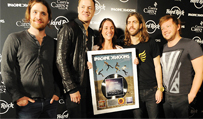One of the chief reasons so many musicians fail in this business is that they don’t understand how to present and market themselves effectively. For independent musicians especially, marketing is crucial to your success. Zoro would know. He didn’t make it to the top by staying in the shadows. For three decades, Z has made the world his stage. Now, the Minister of Groove shares what you must know to score your own big gig.
By Zoro
1. Showcase. The easiest way to get hired in our electronic era is by showcasing your talents on the internet. Post videos of yourself performing on your own website, YouTube, Vimeo, etc. I know a few big-name artists who flew in musicians to audition after viewing them online, so I know for certain this is a proven strategy. You also should have DVDs and CDs with your best performances readily available, since not everyone is on the e-train.
2. Promote. One of the main purposes of promotion is to increase awareness of you as a player to other potential employers––producers, recording artists, musical directors and other musicians. Throughout my career, I made sure I always had business cards on me and handed them to every prospect I met. Many financially lucrative opportunities came to me as a result of something as simple as handing out a professional-looking business card. I also utilize Facebook, Twitter and LinkedIn and recommend you do the same since they are such powerful tools.
3. Materialize. The word “materialize” means to appear or become present. Most everyone in the entertainment industry makes himself present with a media kit of some kind. Having a media kit gave me an edge early on, because it provided a way for me to be remembered among the scores of musicians who would try out for a big gig. Your first media kit doesn’t have to be anything fancy. Get a glossy black folder, staple a business card on it and throw in a one-page resume, photo and a one-page bio that directs readers to online sites where your performances are posted.
4. Cultivate. It’s imperative that you cultivate your on-stage and off-stage image. How you conduct yourself is a huge part of selling yourself. The thing that helped me stand out the most was being reliable, professional and making myself as easy to work with as possible. I literally built a solid 30-year career from that simple, yet powerful, strategy.
5. Network. Every break you get will be through personal rela-tionships you develop over time. All of my breaks came as a result of friends or teachers who recommended me for gigs. If you want to succeed, you should be consistently expanding your list of new contacts and maintaining contact with old ones. Just as it is with a multi-level company, you need to have a long list of customers under your down line to help market you and your product if you expect your numbers to increase.














